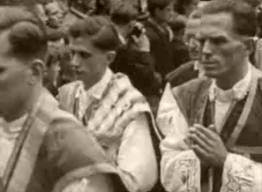Click
here to see Archbishop Stack of Cardiff receive the Pallium from Pope Benedict XVI. Now His Grace just needs a Cardiff City FC scarf and a few prayers.

A LITANY ON BEHALF OF BISHOPS
Lord have mercy on us.
Christ have mercy on us.
Lord have mercy on us.
Christ hear us.
Christ, graciously hear us.
God, the Father of Heaven, have mercy on us.
God, the Son, Redeemer of the world, have mercy on us.
God, the Holy Ghost, have mercy on us.
Holy Trinity, one God, have mercy on us.
Holy Mary, Queen of Heaven and earth, pray for us.
St. Joseph, Protector of Holy Mother Church, pray for us.
St Michael, all Archangels, special servants of Bishops, pray for us.
St John the Baptist, Herald of the Lord, pray for us.
St Peter, pray for us.
St Paul, pray for us.
St Andrew, pray for us.
St John, pray for us.
St Thomas, pray for us.
St James, pray for us.
St Philip, pray for us.
St Bartholomew, pray for us.
St Matthew, pray for us.
St James, pray for us.
St Simon, pray for us.
St Thaddeus, pray for us.
St Barnabas, pray for us.
St Matthias, pray for us.
O Holy Apostles, our first Bishops, we beg your intercession on behalf of your successors;
St Thomas Becket, pray for us.
St Blaise, pray for us.
St Boniface, pray for us.
St Cyprian, pray for us.
St. Ignatius of Antioch, pray for us.
St. Irenaeus, pray for us.
St John Fisher, pray for us.
St. Polycarp, pray for us.
All martyred Bishops; pray for us.
St Athanasius, pray for us.
St Alphosus Liguori, pray for us.
St Ambrose, pray for us.
St Anslem, pray for us.
St Augustine, pray for us.
St Basil and Gregory Nazianzen pray for us
St Bonaventure, pray for us.
St Cyril of Alexandria, pray for us.
St Cyril of Jerusalem, pray for us.
St Francis De Sales, pray for us.
St Hilary, pray for us.
St Isadore of Seville, pray for us.
St Peter Chrsologus, pray for us.
St Peter Damian, pray for us.
St Robert Bellarmine, pray for us.
All Bishops-Doctors of the Church, pray for us.
St Albert the Great, pray for us.
St Ansgar, pray for us.
St Charles Borromeo, pray for us.
St Ildephonsus, pray for us.
St Methodius, pray for us.
St Nicolas, pray for us.
St Norbert, pray for us.
St Patrick, pray for us.
St Richard, pray for us.
Sts. Timothy and Titus, pray for us.
St William, pray for us.
St Wulfran, pray for us.
All Bishops who have spread the light of Christ; pray for us.
St Leo the Great, pray for us.
St Pius V, pray for us.
St Thomas Aquinas, pray for us.
St Pius X, pray for us.
All Saints who have helped further the Faith through teaching, pray for us.
That all bishops will maintain complete obedience to the Holy Father, we beseech Thee, hear us.
That all bishops will remain faithful to the Magisterium of the Church, we beseech Thee, hear us.
That all bishops will defend the Faith and moral teachings of the Church, we beseech Thee, hear us.
That all bishops will uphold the true teachings of the Ecumenical Councils, we beseech Thee, hear us.
That all bishops will allow and defend all duly authorised Rites of the Mass, we beseech Thee, hear us.
That all bishops will staunchly defend the unborn, the elderly, the sick and all defenceless people, we beseech Thee, hear us.
That all bishops will provide for true and complete education of the Faith for all souls in their care, we beseech Thee, hear us.
That all bishops will exercise the powers of their office to defend the faithful against heretics, apostates, and false prophets and teachers, we beseech Thee, hear us.
That all bishops will use their authority and powers to correct errors and falsehoods, we beseech Thee, hear us.
That all bishops will stand up for the rights of the Church when infringed upon by the State, we beseech Thee, hear us.
That all bishops will develop a great devotion to the Sacred Heart of Jesus and the Immaculate Heart of Mary, we beseech Thee, hear us.
That all bishops will be living examples of the virtues, we beseech Thee, hear us.
That all bishops will look to their saintly predecessors as examples of how they should carry out their vocations, we beseech Thee, hear us.
That all bishops will encourage true vocations to the priesthood and religious life, we beseech Thee, hear us.
That all bishops will boldly proclaim the message of Our Lady of Fatima, we beseech Thee, hear us.
That all bishops will concentrate their energies more on the spiritual than on the material needs of the faithful, we beseech Thee, hear us.
That all bishops will teach and preach the truth of Humanae Vitae and Familiaris Consortio.
O God, look with favour on Thy servants, Thy bishops, whom Thou hast appointed as teachers and defenders of Thy faithful here on earth. Grant that by word and example they may assist those over whom they have been placed, so that shepherds and flocks may together attain everlasting life, through Jesus Christ, Our Lord. Amen.



 hem on one side in a mean-spirited protestant way.
hem on one side in a mean-spirited protestant way.
























